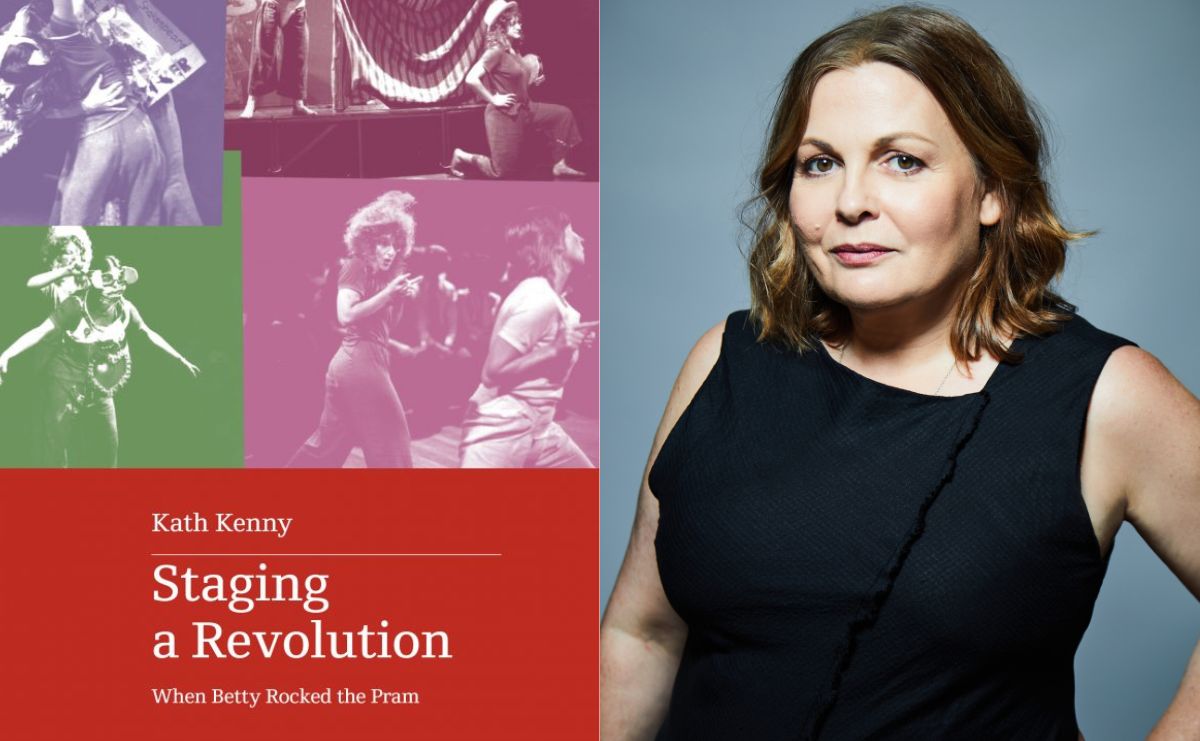Kath Kenny is an essayist, arts reviewer and researcher whose book, Staging a Revolution: When Betty Rocked the Pram, provides a detailed exploration of the cultural revolution of the 1970s. By focusing on theatre as a thinking medium, Kenny explores the ways in which women’s liberation changed the setting of the world’s stage.
Betty Can Jump is the name of a play that was first performed at an old pram factory back when women were still prohibited from drinking in bars. The title references lines from a book named John and Betty, which indoctrinated 1950s school children with sexist stereotypes. Born through a lack of roles for women, and nurtured by the consciousness-raising conversations of a brilliant collective, the play Betty Can Jump satirised gender roles and heteronormative values, with attitude, flair and confrontational costumes.
Kenny’s initial research, an endless exploration of archive boxes related to Betty Can Jump, coincided with the emergence of the #MeToo movement. Areas of overlap, like the involvement of women in theatre and film, echoed through twin spaces cacophonous with male voices as default narratives were overturned.
Dealing with topics like heteronormativity, binary stereotypes, sexual hypocrisy and motherhood, Kenny’s transformative and revolutionary work traces a sizeable paradigm shift across the arts world and wider society. The focus of this book zooms in to explore the lives and experiences of individual women themselves before panning out to examine their contexts.
Kenny’s first chapter focuses on Kerry Dwyer, who, inspired by Polish theatre director Jerzy Grotowski, yearned to strip aways her masks and be seen. She intended to start her own theatre company, but was instead drawn to Melbourne’s Pram Factory theatre, a defunct pram factory where plays were created amid expressive knitting and a haphazard democracy.
Dwyer became one-among-many creative minds bleeding with rage and a drive toward revolution. These artists embraced the Australian vernacular and revelled in their rejection of stuffy traditions. The voices of Helen Garner, Yvonne Marini, Jude Kuring, Evelyn Krape, Claire Dobbin and others united as the Pram Factory grew and benefited creatively from female solidarity. Alongside the consciousness-raising impacts of this ad hoc collective, however, the male-dominated origins continued to have an impact upon group dynamics and women’s opportunities.
Kenny explores the difference between compulsory self-revelation and the act of silencing women (a dichotomy that doesn’t appear to apply equally to men) through drawing parallels between a personal Twitter war and contemporary public reactions to Helen Garner’s 1995 novel, The First Stone. Garner’s reputation as a writer had not yet been established in the early days of the Pram Factory, but remnants of the Betty Can Jump era can be found in Garner’s first novel, Monkey Grip.
The author peers into the generational chasm between her generation’s conception of feminism and that of Garner, exploring how, in cultural landscapes dominated by male voices, it is necessary for women to control their own narratives.
Staging a Revolution paints a vivid picture of Betty Can Jump’s opening night in 1972, depicting a scene in which Caroline Chisholm’s externally-imposed lunatic/saint framing took centre stage, and others in which powerful words crafted by Louisa Lawson and Vida Goldstein were dramatically co-opted. Young women swearing and speaking openly about women’s issues were considered controversial acts back when the play first provided its anarchic, politically-volatile exploration of the ontology of ‘woman’ and the impacts of social conditioning. Words from Garner’s What is a Woman speech – still relevant today – stand out among myriad Betty Can Jump quotes.
Kenny’s cohesive reflections on the play’s ephemeral nature and fluid content are intelligent and honest. She critiques the play’s focus on middle-class white women, describing the lack of intersectionality as stemming from a need to understand one’s own story first. While the play’s thematic minutiae were personal to a specific core group of women, there were undoubtedly elements of female relatability that transcended factors of race and class.
Meticulously researched and logically organised, Kenny’s book outlines a legacy in theatrical and generational terms, with extensive notes and a palpable nostalgia for hope. Kenny does not romanticise the era, but she does resurrect it, comparing the past with an eerily resonant present, perceptively contrasting second and third wave feminst attitudes. Pages of photographs bring characters and scenes to monochromatic life, alongside an array of vivid descriptions, retrospective interviews and direct quotes from the few who remember.
Read: Book review: Seeing Other People, Diana Reid
Staging a Revolution: When Betty Rocked the Pram is a dense and fascinating book, emphasising the personal inherent within the political. It will resonate with the generation who refused to be left holding the baby, and those who grew up to inherit the stage.
Staging a Revolution: When Betty Rocked the Pram by Kath Kenny
Publisher: Upswell Publishing
ISBN: 9780645248050
Format: Paperback
Pages: 270 pp
Release Date: 1 September 2022
RRP: $29.99





